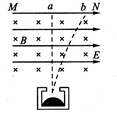如图所示,一天然放射性物质射出三种射线,经过一个匀强电场和匀强磁场共存的区域(方向如图所示),调整电场强度E和磁感应强度B的大小,使得在MN上只有两个点受到射线照射,下面的判断正确的是

A.射到b点的一定是α射线
B.射到b点的一定是β射线
C.射到b点的一定是α射线或β射线
D.射到b点的一定是γ射线
答案:C
如图所示,一天然放射性物质射出三种射线,经过一个匀强电场和匀强磁场共存的区域(方向如图所示),调整电场强度E和磁感应强度B的大小,使得在MN上只有两个点受到射线照射,下面的判断正确的是

A.射到b点的一定是α射线
B.射到b点的一定是β射线
C.射到b点的一定是α射线或β射线
D.射到b点的一定是γ射线
答案:C